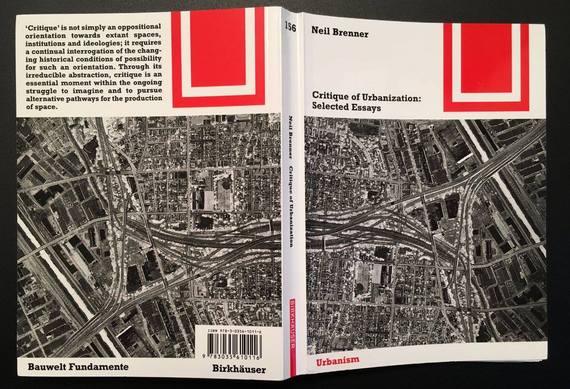Our National Park Service recently granted us some comic relief to a tremendously challenging period in American history by tweeting climate change facts from rogue accounts, defying a White House decree that had censored them. Twitter accounts such as "AltUSNatParkService" emerged in protest of the Trump administration's unapologetic distortion of information and shameless promotion of "alternative facts", a phrase coined by Kellyanne Conway in defense of White House Press Secretary Sean Spicer's fallacious claims regarding the crowd size at Donald Trump's inauguration. Since then, "alternative facts" has become shorthand for information believed to be true regardless of the objective evidence at hand.
This rise of the "alternative"--which could be interpreted as a desire for an "other reality" that better aligns with our values and interests--coincides with the recent publication of Harvard Professor Neil Brenner's new book, Critique of Urbanization, which centers on the topic of "alter-urbanization".
Just as the alt-right employs "alternative facts" in hopes of realizing their political desires, "alter-urbanization" aims for a certain urban future, namely, one that can positively answer the question: Is there an urbanization where citizens hold the 'right to the city'?
As an example of the great challenge this model faces, Brenner paints a provocative vignette in Chapter 7. The High Line was promoted as a "brilliant, far-sighted design intervention, initially spearheaded through a community-based initiative". However, despite the talent and good intentions of designers and planners, and even the significant democratic engagement, the High Line in Chelsea infamously transformed into a site of intense gentrification. This is a discouraging case for any aspiring planners committed to improving urban livelihoods. Is there really no hope for the profession? After all, it is clear that the High Line is not a rare exception, with comparable instances manifesting around the globe.
According to Brenner, the problem with the High Line was that the focus of designers and planners was too "narrow". Resisting gentrification was not so much about design, but "the broader system of rules - for instance, regarding land-use, property ownership, financing, taxation, investment and public goods--that govern the city, region and territory". But this leads us to an impasse: Can planners really influence these matters under neoliberal urbanism?
Brenner suggests that those "concerned with social justice...can and must push beyond the formal, spatially reductionist vision of the city as 'bunches of buildings set in floating pods'". This would require an "open city" where investments do not succumb to private interests, public institutions protect common resources and city dwellers have "secured equal capacities to influence decisions". This open city could only be realized when people possess 'the right to the city', a concept referring to a "militant, persistent demand for the democratization of control over the collective means of producing urban space."
Auspiciously, Brenner introduces this vision on the heels of the New Urban Agenda, an ambitious global document aspiring to guide international thinking on housing and sustainable urban development for the next 20 years. Brenner's new book offers relevant insight into our current patterns of urbanization and asks timely questions that relate directly to the full and successful implementation of the Agenda and the United Nations Sustainable Development Goals.
Critique of Urbanization arrives at a pivotal moment, as "planetary urbanization" and growing global instability, not least resulting from urban inequality and climate change, call into question our current trajectories. As critically-minded planners and scholars, we much consider whether Brenner's "alter-urbanization" is necessary, and, if so, what steps we must take to actualize it.

